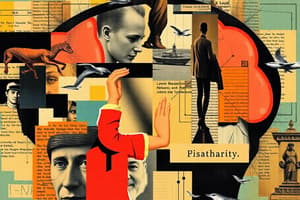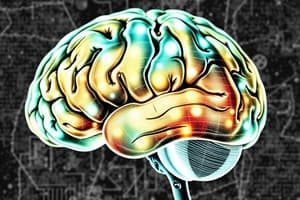Podcast
Questions and Answers
What is psychology?
What is psychology?
The science of mental processes and behavior.
What are the four goals of psychologists?
What are the four goals of psychologists?
- Explain behavior (correct)
- Describe behavior (correct)
- Predict behavior (correct)
- Control / change behavior (correct)
Psychology is considered a science because it relies on intuition and personal experiences.
Psychology is considered a science because it relies on intuition and personal experiences.
False (B)
Which of the following approaches to psychology emphasizes the scientific study of observable behaviors and their environmental influences?
Which of the following approaches to psychology emphasizes the scientific study of observable behaviors and their environmental influences?
The Psychodynamic Approach, founded by Sigmund Freud, emphasizes the role of unconscious conflicts in shaping behavior and mental health.
The Psychodynamic Approach, founded by Sigmund Freud, emphasizes the role of unconscious conflicts in shaping behavior and mental health.
What is the humanistic approach to psychology?
What is the humanistic approach to psychology?
What is the main focus of the cognitive approach to psychology?
What is the main focus of the cognitive approach to psychology?
The Evolutionary Approach emphasizes the adaptive nature of behavior, suggesting that behaviors that promote survival and reproduction are more likely to be passed down through generations.
The Evolutionary Approach emphasizes the adaptive nature of behavior, suggesting that behaviors that promote survival and reproduction are more likely to be passed down through generations.
Which of the following is not a main research method used in psychology?
Which of the following is not a main research method used in psychology?
What is Naturalistic Observation?
What is Naturalistic Observation?
What does a correlation tell you?
What does a correlation tell you?
A positive correlation indicates that as one variable increases, the other variable decreases.
A positive correlation indicates that as one variable increases, the other variable decreases.
A negative correlation indicates that as one variable increases, the other variable also increases.
A negative correlation indicates that as one variable increases, the other variable also increases.
Correlation implies causation.
Correlation implies causation.
What is the main advantage of using experiments in psychological research?
What is the main advantage of using experiments in psychological research?
What is the independent variable?
What is the independent variable?
What is the nervous system, and what is its main function?
What is the nervous system, and what is its main function?
What is plasticity?
What is plasticity?
Which of the following is NOT a major division of the nervous system?
Which of the following is NOT a major division of the nervous system?
What is the main function of the autonomic nervous system?
What is the main function of the autonomic nervous system?
What is the somatic nervous system?
What is the somatic nervous system?
What are the three major divisions of the brain?
What are the three major divisions of the brain?
Which part of the brain is responsible for control of balance and coordination?
Which part of the brain is responsible for control of balance and coordination?
Which part of the brain is involved in regulating arousal, sleep, and wakefulness?
Which part of the brain is involved in regulating arousal, sleep, and wakefulness?
Which part of the brain plays a key role in visual reflexes and auditory processing?
Which part of the brain plays a key role in visual reflexes and auditory processing?
Which part of the brain includes the limbic system, a network of structures involved in emotions, memory, and motivation?
Which part of the brain includes the limbic system, a network of structures involved in emotions, memory, and motivation?
What is the main function of the cerebellum?
What is the main function of the cerebellum?
What is the main function of the amygdala?
What is the main function of the amygdala?
What is the main function of the hippocampus?
What is the main function of the hippocampus?
What is the main function of the hypothalamus?
What is the main function of the hypothalamus?
Which of the following is NOT one of the four lobes of the cerebral cortex?
Which of the following is NOT one of the four lobes of the cerebral cortex?
What are the main functions of the frontal lobe?
What are the main functions of the frontal lobe?
What is the main function of the parietal lobe?
What is the main function of the parietal lobe?
What is the main function of the temporal lobe?
What is the main function of the temporal lobe?
The right side of the brain is typically associated with logic, language, and analytical skills.
The right side of the brain is typically associated with logic, language, and analytical skills.
The left side of the brain is typically associated with creativity, spatial reasoning, and emotional processing.
The left side of the brain is typically associated with creativity, spatial reasoning, and emotional processing.
Which part of a neuron receives information from other neurons?
Which part of a neuron receives information from other neurons?
Which part of a neuron transmits information to other neurons?
Which part of a neuron transmits information to other neurons?
What is the function of the soma in a neuron?
What is the function of the soma in a neuron?
What are terminal buttons, and what is their function?
What are terminal buttons, and what is their function?
What is a synapse?
What is a synapse?
What is an action potential?
What is an action potential?
What is the primary focus of health psychology?
What is the primary focus of health psychology?
Which theory focuses on the role of attitudes and beliefs in shaping behavior?
Which theory focuses on the role of attitudes and beliefs in shaping behavior?
Which stage in the Stages of Change Model involves recognizing the need for change but not yet taking action?
Which stage in the Stages of Change Model involves recognizing the need for change but not yet taking action?
The Preparation/Determination stage involves making a plan and preparing to take action.
The Preparation/Determination stage involves making a plan and preparing to take action.
The Action/Willpower stage entails implementing the planned changes and actively engaging in new behaviors.
The Action/Willpower stage entails implementing the planned changes and actively engaging in new behaviors.
What is the maintenance stage in the Stages of Change Model?
What is the maintenance stage in the Stages of Change Model?
Which of the following is not a benefit of social support?
Which of the following is not a benefit of social support?
What are stressors?
What are stressors?
Which type of stress is associated with negative or unpleasant experiences?
Which type of stress is associated with negative or unpleasant experiences?
Which type of stress is associated with positive or challenging experiences?
Which type of stress is associated with positive or challenging experiences?
What are hassles?
What are hassles?
What are major life events?
What are major life events?
What are catastrophes?
What are catastrophes?
Which source of stress involves high expectations and demands from external sources?
Which source of stress involves high expectations and demands from external sources?
Which source of stress involves feeling blocked from achieving a goal?
Which source of stress involves feeling blocked from achieving a goal?
Which source of stress involves having to choose between two equally desirable or undesirable options?
Which source of stress involves having to choose between two equally desirable or undesirable options?
What is learned helplessness?
What is learned helplessness?
What is the main difference between approach-approach conflict and avoidance-avoidance conflict?
What is the main difference between approach-approach conflict and avoidance-avoidance conflict?
What is approach-avoidance conflict?
What is approach-avoidance conflict?
Which of the following is not one of the three phases of the General Adaptation Syndrome?
Which of the following is not one of the three phases of the General Adaptation Syndrome?
What is the alarm phase of the General Adaptation Syndrome?
What is the alarm phase of the General Adaptation Syndrome?
What is the resistance phase of the General Adaptation Syndrome?
What is the resistance phase of the General Adaptation Syndrome?
What is the exhaustion phase of the General Adaptation Syndrome?
What is the exhaustion phase of the General Adaptation Syndrome?
What is the primary focus of the nature vs. nurture debate in developmental psychology?
What is the primary focus of the nature vs. nurture debate in developmental psychology?
What is a cross-sectional design in developmental research?
What is a cross-sectional design in developmental research?
What is a longitudinal design in developmental research?
What is a longitudinal design in developmental research?
What are teratogens?
What are teratogens?
Which stage of prenatal development spans from the first two weeks after conception to about two months?
Which stage of prenatal development spans from the first two weeks after conception to about two months?
Which stage of prenatal development spans from week 2 to week 8 after conception?
Which stage of prenatal development spans from week 2 to week 8 after conception?
Which stage of prenatal development spans from the end of month 2 to 9 months following conception?
Which stage of prenatal development spans from the end of month 2 to 9 months following conception?
What are schemas in Jean Piaget's theory of cognitive development?
What are schemas in Jean Piaget's theory of cognitive development?
What is assimilation in Jean Piaget's theory?
What is assimilation in Jean Piaget's theory?
What is accommodation in Jean Piaget's theory?
What is accommodation in Jean Piaget's theory?
In which stage of Piaget's cognitive development do infants develop an understanding of the world through sensory experiences and motor actions?
In which stage of Piaget's cognitive development do infants develop an understanding of the world through sensory experiences and motor actions?
In which stage of Piaget's cognitive development do children develop the ability for symbolic thought and pretend play?
In which stage of Piaget's cognitive development do children develop the ability for symbolic thought and pretend play?
In which stage of Piaget's cognitive development do children develop logical reasoning skills and the ability to perform mental operations with concrete objects?
In which stage of Piaget's cognitive development do children develop logical reasoning skills and the ability to perform mental operations with concrete objects?
In which stage of Piaget's cognitive development do individuals develop abstract thinking, hypothetical reasoning, and the ability to solve problems systematically?
In which stage of Piaget's cognitive development do individuals develop abstract thinking, hypothetical reasoning, and the ability to solve problems systematically?
What is the main purpose of the Strange Situation experiment?
What is the main purpose of the Strange Situation experiment?
Which parenting style is characterized by high expectations, strict rules, and little room for discussion?
Which parenting style is characterized by high expectations, strict rules, and little room for discussion?
Which parenting style is characterized by high expectations, clear communication, warmth, and responsiveness to children's needs?
Which parenting style is characterized by high expectations, clear communication, warmth, and responsiveness to children's needs?
Which parenting style is characterized by a lack of involvement, warmth, and responsiveness to children's needs?
Which parenting style is characterized by a lack of involvement, warmth, and responsiveness to children's needs?
Which parenting style is characterized by few limits, high levels of warmth, and acceptance of a child's behavior?
Which parenting style is characterized by few limits, high levels of warmth, and acceptance of a child's behavior?
Flashcards
Psychology
Psychology
The scientific study of mental processes and behavior.
Goals of Psychology
Goals of Psychology
Describe, predict, explain, and control/change behavior.
Biological Approach
Biological Approach
Focuses on how biological factors influence behavior and mental processes.
Behavioral Approach
Behavioral Approach
Signup and view all the flashcards
Psychodynamic Approach
Psychodynamic Approach
Signup and view all the flashcards
Humanistic Approach
Humanistic Approach
Signup and view all the flashcards
Cognitive Approach
Cognitive Approach
Signup and view all the flashcards
Evolutionary Approach
Evolutionary Approach
Signup and view all the flashcards
Sociocultural Approach
Sociocultural Approach
Signup and view all the flashcards
Descriptive Research
Descriptive Research
Signup and view all the flashcards
Correlational Research
Correlational Research
Signup and view all the flashcards
Experimental Research
Experimental Research
Signup and view all the flashcards
Naturalistic Observation
Naturalistic Observation
Signup and view all the flashcards
Correlation
Correlation
Signup and view all the flashcards
Causation
Causation
Signup and view all the flashcards
Experiment
Experiment
Signup and view all the flashcards
Independent Variable
Independent Variable
Signup and view all the flashcards
Dependent Variable
Dependent Variable
Signup and view all the flashcards
Nervous System
Nervous System
Signup and view all the flashcards
Plasticity
Plasticity
Signup and view all the flashcards
Autonomic Nervous System
Autonomic Nervous System
Signup and view all the flashcards
Somatic Nervous System
Somatic Nervous System
Signup and view all the flashcards
Hindbrain
Hindbrain
Signup and view all the flashcards
Midbrain
Midbrain
Signup and view all the flashcards
Forebrain
Forebrain
Signup and view all the flashcards
Cerebellum
Cerebellum
Signup and view all the flashcards
Amygdala
Amygdala
Signup and view all the flashcards
Hippocampus
Hippocampus
Signup and view all the flashcards
Hypothalamus
Hypothalamus
Signup and view all the flashcards
Cerebral Cortex
Cerebral Cortex
Signup and view all the flashcards
Frontal Lobe
Frontal Lobe
Signup and view all the flashcards
Parietal Lobe
Parietal Lobe
Signup and view all the flashcards
Temporal Lobe
Temporal Lobe
Signup and view all the flashcards
Occipital Lobe
Occipital Lobe
Signup and view all the flashcards
Right Brain
Right Brain
Signup and view all the flashcards
Left Brain
Left Brain
Signup and view all the flashcards
Neuron
Neuron
Signup and view all the flashcards
Dendrites
Dendrites
Signup and view all the flashcards
Soma
Soma
Signup and view all the flashcards
Axon
Axon
Signup and view all the flashcards
Terminal Buttons
Terminal Buttons
Signup and view all the flashcards
Synapse
Synapse
Signup and view all the flashcards
Action Potential
Action Potential
Signup and view all the flashcards
Study Notes
Unit 1: History of Psychology/Research Methods and Biological Basis of Behavior
- Psychology is the science of mental processes and behavior.
- The four goals of psychologists are to describe, predict, explain, and control/change behavior.
- Psychology is considered a science because it uses research and observation to make conclusions about behavior and thought.
- The biological approach views human and animal behavior as a direct result of events in the body.
- The behavioral approach focuses on observable actions and environmental influences.
- The psychodynamic approach, developed by Sigmund Freud, suggests mental and behavioral problems arise from conflicts between conscious and unconscious desires.
- The humanistic approach emphasizes free will, self-actualization, and the inherent growth of individuals.
- The cognitive approach studies mental processes like memory, thinking, and problem-solving.
- The evolutionary approach examines behavior in terms of natural selection and adaptation for reproductive success.
- The sociocultural approach examines the influences of social interactions and cultural factors on behavior.
Research Methods in Psychology
- Descriptive research observes and records behavior in natural settings.
- Correlational research explores relationships between variables.
- Experimental research investigates cause-and-effect relationships, actively manipulating variables.
- Positive correlation: Variables move in the same direction (as one increases, the other increases).
- Negative correlation: Variables move in opposite directions (as one increases, the other decreases).
- Correlation does not equal causation.
- Experiments help isolate causal relationships.
- Independent variable: The variable manipulated by the researcher.
- Dependent variable: The variable measured to determine the effect of the independent variable.
Biological Basis of Behavior
- The nervous system is the body's electrochemical communication system.
- Plasticity is the brain's ability to change and adapt.
- The autonomic nervous system automatically controls internal organs.
- The somatic nervous system relays sensory and motor information.
- The brain has three major divisions: the hindbrain (medulla, cerebellum, pons), midbrain (tectum and tegmentum), and forebrain (limbic system, thalamus, basal ganglia, cerebral cortex).
- The four lobes of the cerebral cortex are the frontal lobe (motor cortex, prefrontal cortex), parietal lobe (somatosensory cortex), temporal lobe (auditory cortex), and occipital lobe (visual cortex).
Unit 2: Health Psychology and Human Development
- Health psychologists focus on maintaining health and preventing/treating illness.
- The theory of reasoned action and theory of planned behavior emphasize the importance of specific intentions for behavior changes.
- Stressors are events that can cause stress, like hassles, major life events, and catastrophes.
- Distress refers to unpleasant happenings, while eustress refers to positive happenings.
- Learned helplessness occurs when repeated exposure to uncontrollable events leads to a tendency to remain in stressful situations.
- Nature vs. nurture investigates the role of inherited characteristics and environmental factors in development.
- Cross-sectional designs study different age groups at one time point.
- Longitudinal designs track the same group of individuals over an extended period.
- Teratogens are agents that can cause birth defects.
- The prenatal stages include the zygote, embryonic, and fetal stages.
Unit 3: Learning, Memory, and Cognition
- Learning is a relatively permanent change in behavior.
- Classical conditioning involves associations between stimuli.
- Operant conditioning involves associations between responses and consequences (reinforcement and punishment).
- Observational learning involves learning by observing others.
- Memory processes include encoding, storage, and retrieval.
- Sensory memory is a brief, initial stage of memory.
- Short-term memory has a limited capacity.
- Long-term memory has a large capacity and stores information for an extended period.
- Concepts can be formal (defined by rules) or natural (based on prototypes).
- Problem-solving strategies include algorithms and heuristics.
- Cognitive biases (confirmation bias, functional fixedness, mental sets) can hinder problem-solving.
Unit 4: Social Psychology and Psychological Disorders and Therapies
- Social cognition is how individuals process social information.
- Attribution theory explains why people behave the way they do, considering internal and external causes, stable vs. unstable causes and controllable vs. uncontrollable causes.
- Fundamental attribution error is the tendency to overestimate the importance of internal traits and underestimate external factors.
- Stereotypes are fixed and generalized beliefs about groups.
- Prejudice is a negative attitude towards a group.
- Discrimination is negative behavior directed towards a group.
- Psychotherapy includes insight therapies (e.g., psychoanalysis, humanistic therapy) and action therapies (e.g., behavioral, cognitive therapy).
- Biomedical therapies involve medical procedures.
- Cognitive-behavioral therapy (CBT) is a common and effective treatment for anxiety and mood disorders.
- Psychological disorders, like anxiety disorders (panic disorder, generalized anxiety disorder, post-traumatic stress disorder), mood disorders (major depression, bipolar disorder), and schizophrenia can be treated with therapies and/or medications.
Studying That Suits You
Use AI to generate personalized quizzes and flashcards to suit your learning preferences.




